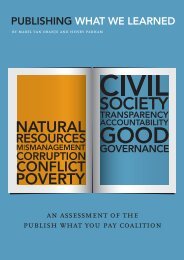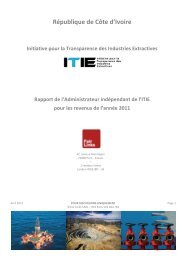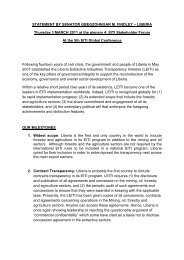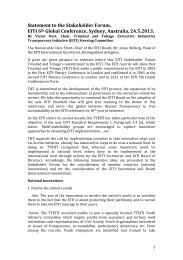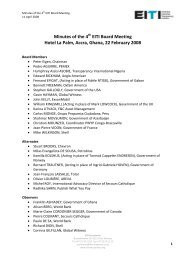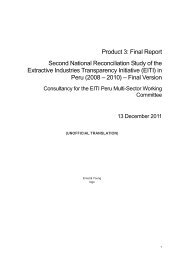EITI Business Guide
EITI Business Guide
EITI Business Guide
Create successful ePaper yourself
Turn your PDF publications into a flip-book with our unique Google optimized e-Paper software.
CASE STUDY 2<br />
In one country, where a state-owned<br />
company (SOC) did not see a clear need<br />
to join the <strong>EITI</strong>, the government<br />
department responsible for regulating<br />
the activities of SOCs was able to use its<br />
influence to encourage the company’s<br />
participation. In this case, the <strong>EITI</strong> was<br />
supported by the Prime Minister’s Office,<br />
which gave political impetus to calls for<br />
wider participation.<br />
14 <strong>EITI</strong> BusInEss GuIdE<br />
12<br />
13<br />
their involvement is among the most difficult to negotiate. For example, the<br />
company may be on both sides of the disclosure process if it receives payments<br />
or production share from other companies as an equity owner and government<br />
representative in a contract, and at the same time makes payments to national<br />
budgets.<br />
However, as with the private sector, state-owned companies also face local and<br />
international pressure to demonstrate social and environmental responsibility.<br />
Many of the issues raised above (see Question 2) will be of increasing relevance<br />
to state-owned companies as they grow in size and influence. For example,<br />
a state-owned company may be considering public stock flotation, and<br />
implementation of the <strong>EITI</strong> can bring international credibility in the eyes<br />
of investors.<br />
My company is not directly involved in resource extraction. What can<br />
my company do to support <strong>EITI</strong> implementation?<br />
although only oil, gas and mining companies make the direct payments to<br />
governments that are covered by the <strong>EITI</strong> requirements, many other companies<br />
are involved in the extraction process and will have a strong interest in the<br />
implementation of the <strong>EITI</strong>. such companies include:<br />
• Upstream service companies that provide hardware and logistics to help extract<br />
oil, gas and minerals. These companies have service agreements with the<br />
extractive companies and a strong interest in the stability and transparency<br />
of their operations.<br />
• Downstream manufacturing companies, such as steel and other industrial and<br />
commercial mineral manufacturers, which have supply agreements with the<br />
extractive sector. These companies want to ensure that their long-term<br />
contracts are on a sustainable footing.<br />
• Ancillary companies along the value chain, including logistics, human resources,<br />
information service, transportation, security, management, accountancy and<br />
auditing companies.<br />
These companies can support the <strong>EITI</strong> even though they are not required to<br />
publish payments to government. as well as supporting the <strong>EITI</strong> through<br />
making public statements of support on their website, they can negotiate <strong>EITI</strong><br />
implementation as part of their service and supply contracts.<br />
These companies can also adhere to the transparency principles in all of their<br />
operations in-country and seek to undertake supportive measures for the sector,<br />
building on their own core business skills. Examples here include:<br />
• IT and accounting companies providing support for the production of the<br />
reporting templates;<br />
• management consulting companies offering support with government and<br />
civil society capacity building; and<br />
• oil service companies offering their hardware and manpower to provide other<br />
infrastructure to the government.<br />
What is ‘civil society’? Why are civil society organisations involved in<br />
the <strong>EITI</strong>?<br />
‘civil society’ is a broad term encompassing all of a country’s social and civic<br />
organisations – such as development charities, academia, community groups,





